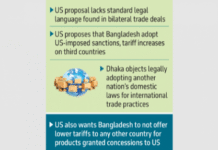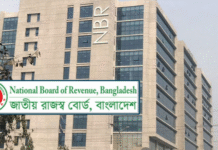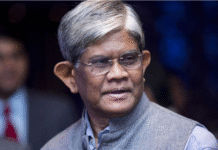Says PM’s adviser as over 200 participants join webinar to drive up investment from the Asian economic giant


The government has assured that potential investors from Japan will be given full cooperation in a bid to drive up the number of investments made in Bangladesh from businesses of the island nation.
“The strength and stability of our economy and our strong political leadership is undoubted. We are very grateful to be considered as a possible destination for further Japanese investments,” said Salman F Rahman, the prime minister’s private industry and investment affairs adviser.
Rahman made these remarks while addressing a virtual discussion styled, ‘Dialogue to drive Japanese investments in Bangladesh’ jointly organised by the Prime Minister’s Office, the International Finance Corporation (IFC) and Japan International Cooperation Agency (JICA) on Wednesday.
Over 200 participants from Japan’s private sector joined the webinar, aimed at attracting investments from the island nation.
During the event, Rahman urged Japanese businesses to take advantage of Bangladesh’s high corporate profitability, business-friendly policies, massive domestic market and strategic access to key markets across the world.
Bangladesh’s economic landscape will transform in a few years with adequate support from the Japanese government, Naoki said.
The ambassador also mentioned Japan’s cooperation in the Bay of Bengal Industrial Growth Belt initiative, the Mass Rapid Transit project and the expansion of Dhaka’s Hazrat Shahjalal International Airport.
“The Moheshkhali-Matarbari Integrated Infrastructure Development Initiative (MIDI), an energy hub, will be a game changer for Bangladesh,” he added.
Naoki also reiterated Japan’s commitment towards Bangladesh’s development in select sectors such as agriculture, healthcare and human resource development.
“The Japanese government has a menu for cooperation. We will leverage that as much as possible,” he said.
Bangladesh Investment Development Authority’s (BIDA) Executive Chairman Md Sirazul Islam highlighted the profitability of the country’s domestic market as found by JETRO’s survey on Asian and Oceania for two years in a row.
“Bangladesh currently has over 300 Japanese companies. In a 2019 survey, it was found that 70.3 per cent of Japanese companies are willing to expand their operations in Bangladesh, which remains the highest proportion in Asia and Oceania,” he said.
The BIDA chief discussed the various initiatives being taken to improve the country’s business climate through Ease of Doing Business reforms and the expansion of an online One Stop Service.
“BIDA’s online and interoperable One Stop Service already provides 18 e-payment enabled services of three agencies and will provide 34 more services of 15 government agencies within the year.
“With the PMO’s guidance, we are preparing an attractive package for investors,” Islam added.
The BIDA executive chairman also mentioned various measures taken by the government to simplify dividend and profit repatriation.
Foreign companies can now access working capital loans from parent companies.
“And at present, we are working to further liberalise the investment regime for foreign businesses,” Islam said.
On Tuesday, Bangladesh Bank announced that all banks and non-banking institutions can now extend financial support to foreign companies against their overseas guarantees. Likewise, the bill-of-entry process was also simplified through automation.
“Our economic zones give you the infrastructural support you need, both on and off-site, at very competitive land prices compared to neighbouring countries,” said Bangladesh Economic Zones Authority’s (BEZA) Executive Chairman Paban Chowdhury.
A 1,000-acre economic zone to be exclusively used by Japanese firms is being developed in Araihazar upazila of Narayanganj, which is Bangladesh’s first ever economic zone under the government-to-government initiative.
Chowdhury also mentioned the fiscal and non-fiscal incentives on offer and highlighted other proactive measures such as the establishment of skills development centres at economic zones.
The total value of money expected to be invested in just three of the economic zones amounts to nearly $17 billion, of which $8 billion will come from foreign investment in manufacturing, he said while quoting UNCTAD.
“But beyond incentives, what is also very important is our non-stop commitment, service delivery mechanism and the speed with which we respond to issues raised by investors,” Chowdhury added.
“The Bangladesh market is a strategic priority for Honda,” said Yuichiro Ishii, CEO and managing director of Honda Bangladesh, which established its first factory in the country back in 2018.
“Despite the Covid-19 pandemic, the demand for motorcycles has gone up and so have our sales and shares. Beyond export, the potential of the Bangladeshi domestic market is too big to miss,” he added.
An official of the Marubeni Corporation, operating in Bangladesh since 1950s, discussed the company’s profitable ventures in textile, infrastructure and fertilizer.
Marubeni’s General Manager Hikari Kawai highlighted the effectiveness of joint platforms such as the Japan-Bangladesh Joint Public Private Economic Dialogue, Japan Bangladesh Society and the Japan Bangladesh Chamber of Commerce and Industry (JBCCI).
“The careful attention provided to Japanese investors and quick disposal of issues cannot be expressed in numbers,” said Kenta Ono, assistant general manager of Sumitomo Corporation, which is developing the Japanese economic zone at Araihazar.
The macroeconomic stability and diligence of Bangladeshi people cannot be understated, he added.
Ono advised prospective investors to utilise the services of BIDA and BEZA as their entry points.
The views shared through this initiative are evidence of Bangladesh’s readiness as a market, said Zuena Aziz, principal coordinator (SDG affairs) of the Prime Minister’s Office, in her concluding remarks.
“It was a pleasure to learn more about the experiences of Japanese businesses operating in Bangladesh. We have taken detailed notes of all your suggestions and we will speedily respond and resolve all issues,” Aziz said.
There is a special appreciation for Japanese innovation and tech-driven solutions in Bangladesh, said Wendy Werner, country manager of IFC (Bangladesh, Bhutan and Nepal).
The ground for investment is also paved well with strong ties based on diplomacy and economic cooperation and IFC will continue to support private sector development in Bangladesh, as it is one of the world’s most promising emerging markets, she said.
Bangladesh is not only a gateway to South Asia, but also to Southeast Asia, said Hayakawa Yuho, chief representative of JICA Bangladesh.
“It is the fastest growing economy in the Asia-Pacific region. We have witnessed Bangladesh’s commitment and it will be the new frontier for Japanese investment,” Yuho added.









